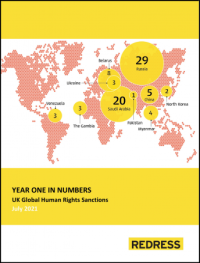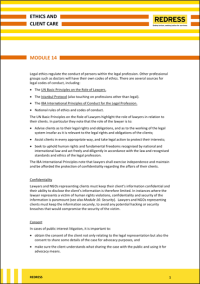Publications
REDRESS’ publications are also available in hard copy format. Please contact us for further information on [email protected].
Launched one year ago on 6 July 2020, the UK’s Global Human Rights Sanctions regime gave the UK Foreign Secretary the ability to sanction persons implicated in human rights abuses anywhere across the globe. The first anniversary of the UK Global Human Rights Sanctions regime provides an opportunity to examine how the UK government has used its new tool for tackling human rights abuses, as detailed in this paper. A data-driven analysis shows 78 designations arising from 11 situations of human rights violations. There was a notable skew towards designations for violations of the right to life and prohibition on torture, with fewer designations for forced labour. Six entities were sanctioned, including military holding companies and public security bureaus. Individuals designated ranged from politicians and military officials to family members of perpetrators and prison doctors.
This training module gives an overview of the evidence of torture, the strategic issues when identifying and preparing torture evidence, characteristics of good pieces of evidence, conducting interviews to collect evidence and writing a witness statement. This module should be read in complementarity with Module 13: Working with Survivors of Trauma.
This training module gives an overview of the legal ethics and the legal code of conduct. It also highlights the role of lawyers or NGOs with their clients, the enhanced responsibility to those representing torture survivors, and the ethical issues relating to cases against torture.
This module provides an overview of the psychological aspects of working with adult and child victims of trauma in strategic litigation. It is designed to inform civil society organisations and legal practitioners who work on human rights litigation and other forms of public interest litigation involving traumas from violence such as torture, sexual abuse and forced disappearances.
This training module gives an overview of torture and ill-treatment in detention settings, the forms of treatment in the context of detention or imprisonment that amount to torture, the legal standards to safeguard against torture and the mechanisms to report torture to prevent or stop it.
This training module covers the writing of human rights claims on behalf of individuals and against States before international and regional treaty bodies. Some of this advice can also be used to assist in writing complaints at the domestic level.
This training module explains what compensation is, its different forms, functions and limits. It also explains who is entitled to compensation and the challenges and obstacles in pursuing compensation in torture cases.
This training module explains what reparation is, its many forms, principles and standards. It also provides practical and comparative examples related to claiming and accessing reparations in different contexts in a survivor-centred manner and proposes strategies to overcome obstacles in the journey towards reparation.








